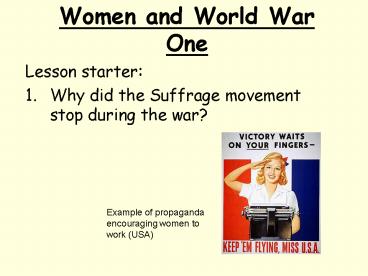Women and World War One PowerPoint PPT Presentation
1 / 28
Title: Women and World War One
1
Women and World War One
- Lesson starter
- Why did the Suffrage movement stop during the war?
Example of propaganda encouraging women to work
(USA)
2
- Today we will understand the ways the lives of
women changed during world war one
3
- The Suffrage Movement was suspended so that
everyone in Britain could help win the war - Men and Women in Britain now had something in
common defeating Germany
Kaiser Wilhelm
4
- As most of the men were away at war, women had to
fill their jobs - Most women worked in munitions factories, making
shells and weapons - Most shells used on the Western Front were made
by women - Men made jokes about shells made by women
5
- Transport
- Women also worked as train and bus conductors,
tram drivers and ambulance drivers
6
- Women also joined the Land Army
- They went out and worked the fields in the
country - They helped produce the food that Britain needed
- This helped with the shortage of farm workers
- The harvest of 1917 was the most successful of
all time
7
Propaganda encouraging women to get out and work
8
(No Transcript)
9
- Women also took up jobs in the fire brigade and
police force
10
- Women could also join the Womens Royal Naval
Service (WRNS) where they did mainly office jobs - This led to the creation of a Womens Army
division (WAAC) although they did not fight on
the front line
11
- Women also joined the Voluntary Aid Detachment,
helping those who were injured in France
12
Create a spider diagram Women's work during
WWI and add in these occupations
- Munitions worker
- Factory worker
- Land army
- Shop worker
- Office worker
- Delivering coal
- Bus or tram driver
- Police force
- Fire service
- Engineers
- Nurses
- Ambulance drivers
- Voluntary Aid Detachment
13
Copy this table into your jotter
TYPE OF WORK NEW WOMEN WORKERS 1914-1919
GOVERNMENT WORK (including munitions) Up by 200,000
OFFICE WORK Up by 500,000
FARM WORK Up by 250,000
WOMENS ARMED FORCES Up by 100,000
NURSING 100,000
ENGINEERING 800,000
14
Thinking time
- Would World War One improve Women's Lives?
- Think about things such as work, money, husbands
and attitudes towards women. - Write down your ideas
15
What happened after the war?
- Most women lost their jobs to men coming back
from war - Many people believed that women had earned a lot
of respect from their hard work during the war - Married Women over 30 were given the vote in 1918
16
Women and World War Two
- Lesson Starter
- Why did women earn more respect from men
following the first world war? - In what way were women rewarded for their
efforts during the first world war?
17
Women and World War Two
- Learning Intentions
- I will gain an understanding of the impact women
had in World War Two - I will gain an understanding of how the
government encouraged women to work
18
World War Two
- During World War Two women did even more work
- They still worked in munitions, land army etc
- Nurseries made it easier for women to get out and
work - Women were also encouraged to look after
neighbours children to allow women out to work
19
World War Two
- As in WW1, the government used propaganda posters
to encourage women to fill in for men. - Propaganda is
- The spreading of information in order to
influence public opinion and to manipulate other
people's beliefs.
20
- Women and the War - clips
21
- Source A is the view of John Smith who fought in
World War one - Women worked hard during the war. They produced
food and weapons for Britain. However, it was the
brave men on The Western Front who really won the
war. - 1. Do you agree with John Smith? Give reasons for
your answer.
22
- Source B is written by Anna Richard, who was part
of the Womens Land Army. - The Land Army was a proper army. We worked from
dawn until the sun went down. I was from London
and had never seen a farm in my life. My hands
bled from the hard work each day. - 2. How useful is Source C for investigating The
Land Army? Give reasons for your answer.
Remember Who, What, Why, When, However
23
(No Transcript)
24
(No Transcript)
25
(No Transcript)
26
(No Transcript)
27
World War Two propaganda
28
Extension Task
- Design a poster in your jotter which encourages
women to work during WW1 or WW2.

